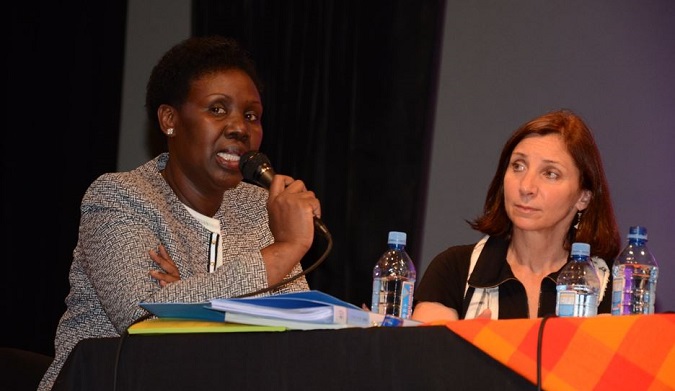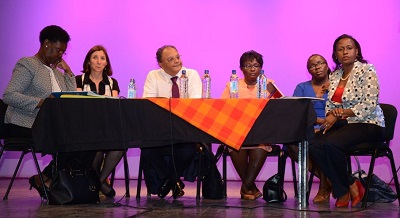Gender Forum-Pushing to Parity in Science, Technology, Engineering and Mathematics (STEM) at Kenya National Theatre
Date:
Nairobi, Kenya: Despite Kenya’s significant progress in achieving gender parity in education, women remain significantly underrepresented in Science, Technology, Engineering and Mathematics (STEM). Educational constraints, cultural norms and gender prejudices/stereotyping influence opportunities and choices, severely reducing the number of women who enroll, complete studies and are employed in their field of expertise in STEM.
It is against this background that UN Women Regional Director for Africa, Ms. Diana Ofwona, participated in a Gender Forum convened by Heinrich Böll Stiftung in Nairobi, Kenya to advocate for gender parity in Science, Technology, Engineering and Mathematics (STEM) subjects and work field.

The Gender Forum is a monthly public dialogue that brings together scholars, law makers and implementers, civil activists, government institutions, students and the general public, aiming at sharing knowledge and inspiring gendered analysis of policy and programmes.
In responding to a question on how we can encourage parents and teachers to motivate girls to pursue their interests in STEM, Ms. Ofwona pointed out that there are available strategies to unlearn learned behaviour. “Parents need to begin to change the narrative regarding girls in STEM, their capabilities and aspirations. Parents through the Boards - should begin to demand equal facilities in girls’ schools as in boys, where they do not exist,” said Ms. Ofwona.
Ms. Ofwona gave an example of Taungana, an African-wide STEM program run by young women in Science and Technology based in South Africa. Every August (Women’s month), Taungana brings together girls in tech-related programs as well as girls from schools, with the aim of expose them and their teachers to STEM-related activities, film it and show their parents and teachers. This exposes students, teachers and parents to the opportunities that arise when girls are involved in this field.
Dr. Monika MacDevette, a representative from UNEP noted that attitudes, stereotypes, behavior, power and control are among the factors inhibiting women from actively taking up STEM subjects and pursuing careers in the STEM field. She encouraged parents and teachers to allow both girls and boys to choose a future for themselves.
On his part, Dr. Kevit Desai, who was representing the private sector pointed out that women need to take up their places not only in industries as a whole, but specifically be on Boards of those industries.
During the plenary session, participants pointed out the need to document and recognize women achievers in STEM subjects and field of work. This can be done through close collaboration and partnerships with the media to highlight the achievements made by girls and women in STEM. This would in turn be a way of encouraging others who wish to pursue the same areas of interest but are either afraid of its technicalities or are inhibited by other social factors like the aforementioned stereotypes.
Ms. Ofwona, noted that women in STEM earn 33% higher than all women in other fields. In this regard, science and technology is core for economic growth. For that purpose, all hands needs to be on deck on STEM. She implored each and every one to have a role in changing the narrative with respect to girl’s education in general, and STEM in particular. This includes religious, cultural and social opinion leaders who can play a critical part in demystifying the cultural beliefs around women taking up STEM subjects.
Ms. Ofwona also affirmed that UN Women, through its programmes is paying greater attention to girls’ enrolment and retention in school; encouragement of girls in STEM streams through Award Systems; and advocating towards ending child marriage and abuse.

The Gender Forum to push for gender parity in Science, Technology, Engineering and Mathematics (STEM) was organized on the basis of UNESCO’s study that found that female students are admitted to engineering and applied science subjects at a significantly lower rate than male students. Overall lower rates of enrolment and high numbers of drop outs during the course of the programmes only worsens the situation.
Similarly, a study by Women who Mentor & innovate in Africa (WMI Africa) found out that, in 2012 the number of registered engineers in Kenya was 1,341 whereby 1,298 (96.8%) were men and 43 (3.2%) were women. These statistics drive home the grim situation on parity in STEM in Kenya.